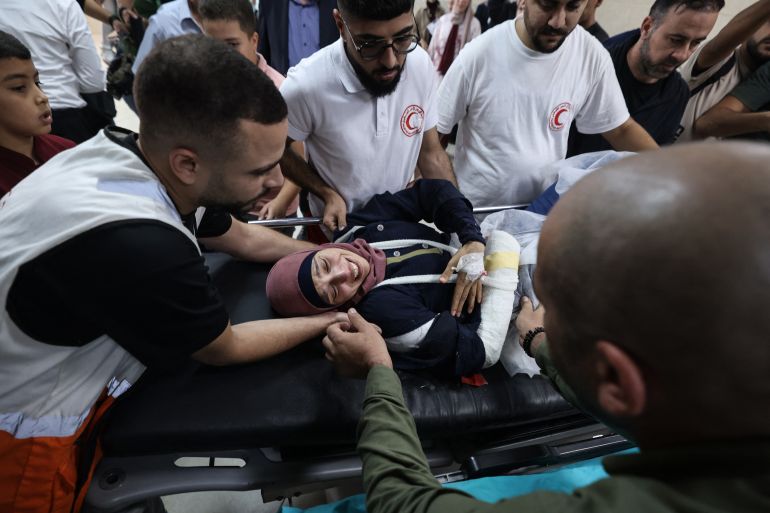Normalising hate: Israel leans in to anti-Palestinian violence, rhetoric
Analysts in Israel say Israel is continuing on the same path, despite the ceasefire in Gaza.

Published On 14 Nov 202514 Nov 2025
Save
The US-imposed ceasefire of October 10 has not stopped Israel’s regular attacks on the Gaza Strip. Nor has it threatened to hold a parliament and society that largely cheered on the war, which has been deemed genocidal by multiple international bodies, accountable for their actions.
Instead, fuelled by what analysts from within Israel have described as an absolute sense of impunity, anti-Palestinian violence has intensified across the country and the occupied West Bank while much of the world continues to look away, convinced that the work of the ceasefire is done.
Recommended Stories
list of 4 itemsend of list
In the parliament, or Knesset, a senior lawmaker and member of the governing party openly defended convicted ultranationalist Meir Kahane, long considered beyond the pale even by members of Israel’s right wing and whose Kach movement has been banned as a “terrorist organisation”. At the same time, the parliament is debating reintroducing the death penalty, as well as expanding the terms of the offences for which it might apply – both unambiguously targeting Palestinians.
Under the legislation, proposed by ultranationalist National Security Minister Itamar Ben-Gvir – who himself has past “terrorism”-related convictions for his outspoken support of Kahane – anyone found guilty of killing Israelis because of “racist” motives and “with the aim of harming the State of Israel and the revival of the Jewish people in its land” would face execution.
That bill passed its first reading this week.
“The absence of any attempt to assert accountability from the outside, from Israel’s allies, echoes into Israel’s own Knesset,” analyst and former Israeli peace negotiator Daniel Levy said. “There’s no sense that Israel has done anything wrong or that anyone should be held to account.”
Even Israel’s media, traditionally cheerleaders of the country’s war on Gaza, has not proven exempt from the hardening of attitudes. Legislation is already under way to close Army Radio because it had been broadcasting what Defence Minister Israel Katz described as political content that could undermine the army, as well as extend what lawmakers have referred to as the so-called “Al Jazeera law”, allowing them to shutter any foreign media perceived as a threat to Israel’s national security.
Advertisement
“Israel has built up this energy through two years of genocide,” Orly Noy, editor of the Hebrew-language Local Call, told Al Jazeera. “That hasn’t gone anywhere.
“Just because there’s a ceasefire and the hostages are back, the racism, the supremacy and the unmasked violence didn’t just disappear. We’re seeing daily pogroms by soldiers and settlers in the West Bank. There are daily attacks on Palestinian bus drivers. It’s become dangerous to speak Arabic, not just within the ‘48, but anywhere,” she said, referring to Israel’s initial borders of 1948.
‘May your village burn’
In the West Bank, Israeli violence against Palestinians has reached unprecedented proportions. According to the United Nations Office for the Coordination of Humanitarian Affairs (OCHA), there were 264 attacks against Palestinians in the month the ceasefire was announced: the equivalent of eight attacks per day, the highest number since the agency first started tracking attacks in 2006.

Israel’s interior appears no less secure from the mob. On Tuesday, a meeting at a private house in Pardes Hanna near Haifa, hosted by Ayman Odeh, a Palestinian member of the Knesset, was surrounded and attacked by a mob of right-wing protesters. As police reportedly stood nearby, Israeli protesters surrounded the house, chanting “Terrorist! Terrorist!” and singing “May your village burn” in an attempt to interrupt the meeting, which was billed as a chance to build “partnership and peace” after “two years characterised mainly by pain and hostility”.
And in the Israeli Supreme Court on Monday, two of the soldiers accused of the brutal gang rape of a Palestinian prisoner at Sde Teiman prison last year were met, not by condemnation, but applause and chants of “We are all Unit 100”, referring to the military unit accused of raping the Palestinian man.
“They’re not cheering rapists, they’re cheering this idea that nothing matters any more,” Ori Goldberg, a political scientist based near Tel Aviv, said. “Genocide devalues everything. Once you’ve carried out a genocide, nothing matters any more. Not the lives of those you’ve killed and, by extension, not your own. Nothing carries any consequence. Not your actions, nothing. We’ve become hollow.”
Seeming to prove Goldberg’s point in the Knesset on Wednesday was Nissim Vaturi, the body’s deputy speaker and a member of Prime Minister Benjamin Netanyahu’s governing Likud party. Vaturi crossed one of Israel’s few political rubicons and directly referenced Kahane, whose name has become a rallying cry for settlers and ultranationalist groups across Israel.

Asked if he was in favour of “Jewish terror”, Vaturi replied “I support it. Believe me, Kahane was right in many ways where we were wrong, where the people of Israel were wrong,” he said, referencing the former lawmakers convicted of “terrorism” offences in both Israel and the US and whose party, Kach, remains a proscribed “terrorist group” across much of the world.
Advertisement
“Once you’ve manufactured consent for genocide, you need to be proactive in dialling the cruelty levels down, which is something we’re not seeing,” analyst and former Israeli peace negotiator Daniel Levy said. “If anything, we’re just seeing it continue. They have dialled the cruelty levels up to 11 … and they’re leaving them there.”

